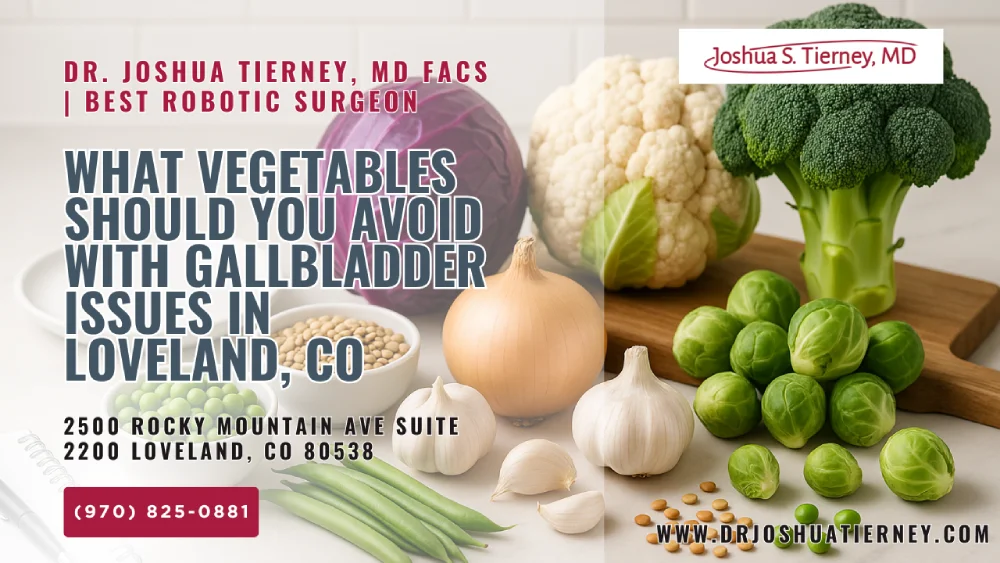For gallbladder problems in Loveland, CO, the best drinks include water, herbal teas like ginger or peppermint tea, and apple juice. These options can help soothe the digestive system, reduce inflammation, and potentially aid in bile flow and stone softening.
Living at 4,982 feet above sea level means your body loses moisture faster than it would at the beach. If you’re dealing with gallbladder pain, sluggish bile flow, or a family history of gallstones, what you choose to sip in this dry Colorado climate can make a noticeable difference. Below, you’ll find the drinks that help — and the ones that hurt — so you can keep your gallbladder happy while enjoying life along the Front Range.
Key Takeaways
- Hydration is non-negotiable: At Loveland’s elevation, aim for at least 10–12 cups of water daily to keep bile thin, reduce stone formation risk, and support overall digestive health. Carry a reusable bottle everywhere.
- Herbal teas offer targeted relief: Ginger, peppermint, and dandelion teas have anti-inflammatory and bile-stimulating effects that can ease gallbladder discomfort. Brew them fresh, unsweetened, and sip warm rather than scalding hot.
- Apple juice supports stone softening: The malic acid in fresh, unfiltered apple juice may help loosen cholesterol stones over time. Limit to one 8-ounce glass a day to avoid excess sugar.
- Skip the usual suspects: Sugary sodas, high-fat dairy shakes, and excessive alcohol can trigger gallbladder spasms or increase cholesterol saturation in bile, making stones more likely to form.
- Small habit tweaks go far: Drink a full glass of water first thing in the morning, swap one coffee for peppermint tea at lunch, and flavor evening water with lemon to build gallbladder-friendly routines without feeling deprived.
- Know when to call a pro: Severe right-upper-quadrant pain, fever, or jaundice requires immediate medical attention. Loveland residents can access nearby gastroenterologists in Fort Collins, Greeley, or specialty imaging at UCHealth Medical Center of the Rockies.
Gallbladder
Even though it’s only about four inches long, the gallbladder plays a crucial role in digesting fat by storing and concentrating bile produced by your liver. Fluid intake directly influences bile consistency: well-hydrated bile flows freely, while thickened bile can stagnate and crystallize into stones. At Northern Colorado’s higher altitude, the body loses water faster through respiration, perspiration, and the naturally dry air. This makes smart beverage choices essential for anyone prone to gallbladder issues.
Fluids Shape Bile Quality
When you don’t drink enough, bile becomes oversaturated with cholesterol, calcium bilirubinate, or pigmented compounds. Over time, these particles clump together and form sludge, then stones. Consistent hydration dilutes bile salts and keeps them moving.
Dehydration Triggers Painful Attacks
A dehydrated gallbladder contracts harder to push out thicker bile, increasing cramp-like pain. Staying evenly hydrated throughout the day, rather than gulping large amounts at once, keeps contractions smooth and less painful.
Gallbladder Health: Daily Hydration Basics
Colorado’s semi-arid climate places its residents in a constant, low-grade dehydration risk. Your gallbladder feels this first. Regular water intake dilutes bile, reduces gallstone formation, and supports every step of digestion.
How Much Water Do You Really Need?
- Start with 10–12 cups (80–96 oz) per day at Loveland’s altitude.
- Add an extra cup for every caffeinated drink or alcoholic beverage.
- Increase intake when exercising or hiking the Devil’s Backbone trails three times per day or more.
Simple Ways to Hit Your Daily Target
- Fill a 24-oz stainless-steel bottle and set phone alarms to empty it three times.
- Flavor water with cucumber, lemon, or mint to boost palatability without sugar.
- Pair every meal or snack with at least one eight-ounce glass to spread intake evenly.
Loveland Lifestyle: Herbal Teas That Make Your Gallbladder Smile
You don’t have to be an herbalist to benefit from plant-based infusions. Certain teas contain compounds that relax the biliary tract, calm inflammation, and gently stimulate bile flow—all helpful for gallbladder discomfort.
| Herbal Tea | Key Active Compounds | Gallbladder Benefits | Ideal Serving |
| Ginger root | Gingerol, shogaol | Reduces inflammation, eases nausea, promotes bile flow | 1 cup, 2–3 times daily |
| Peppermint | Menthol, rosmarinic acid | Relaxes smooth muscle, reduces spasms, improves fat digestion | 1 cup after meals |
| Dandelion root | Taraxacin, inulin | Stimulates liver bile production, detox support | 1 cup mid-morning |
| Chamomile | Apigenin | Calms overall digestion, reduces stress that may trigger attacks | 1 cup at bedtime |
According to the British Herbal Compendium, these infusions are safe and effective for most adults, although people with a specific health condition such as reflux should use peppermint cautiously. Always discuss the potential risks and benefits with a qualified healthcare professional before using any supplements.
Ginger Tea: Nature’s Anti-Inflammatory
Fresh ginger slices steeped for 10 minutes provide a warming beverage that quells nausea, combats oxidative stress, and keeps bile moving. It pairs well with a squeeze of lemon for extra vitamin C.
Peppermint Tea: Smooth Muscle Relaxant
Menthol in peppermint relaxes the sphincter of Oddi (the valve regulating bile release). Sip a cup after fatty meals to prevent cramps. Avoid if you have acid reflux, as peppermint can loosen the lower esophageal sphincter.
Dandelion Root Tea: Gentle Liver & Gallbladder Tonic
Roasted dandelion root tastes similar to coffee but contains no caffeine. It encourages the liver to produce more bile, which dilutes and pushes existing bile through the gallbladder, reducing stagnation.
Gallstone Softening Spotlight: Apple Juice
Apple juice has earned folk-remedy fame for “dissolving” gallstones, but what does science say? While it won’t melt rocks overnight, its malic acid may soften cholesterol stones and improve bile duct motility.
Malic Acid and Stone Softening
- Malic acid binds to calcium, potentially breaking down calcified edges of stones.
- It increases urinary citrate, reflecting systemic alkalinization that may translate to bile.
- Early laboratory studies, though small, suggest modest benefits. Randomized controlled trials are still needed for definitive scientific evidence.
Safest Way to Use Apple Juice
- Choose fresh, unfiltered apple juice to maximize malic acid content.
- Limit to one eight-ounce glass per day to control sugar load.
- Rinse mouth or brush teeth afterward; natural sugars can harm enamel.
If you’re diabetic or limiting carbohydrates, consider diluting juice 50/50 with water or switching to apple-cider vinegar water (1 Tbsp ACV in 8 oz water) for similar acids with fewer calories.
Northern Colorado Nutrition Caveats
Many residents in the Fort Collins area prefer integrative approaches that blend traditional and herbal care. Under the supervision of a doctor, some patients supplement with milk thistle or turmeric to reduce abdominal discomfort linked to biliary inflammation. Yet, little scientific support exists for several popular detox drinks, and certain herbs may interfere with medications used to treat hypertension or IBS symptoms. Always consult your doctor or pharmacist if you take prescription drugs.
Loveland & Greeley: Drinks to Limit or Avoid
Colorado craft beverages are popular, but some can wreak havoc on a sensitive gallbladder. Knowing which drinks to sidestep prevents painful flare-ups and keeps stones from growing larger.
Sugary Sodas
High-fructose corn syrup spikes triglycerides in the liver, thickening bile and boosting cholesterol saturation. Carbonation can also cause bloating, pressing on the gallbladder and intestine.
Alcohol in Excess
While moderate wine may aid HDL levels, larger quantities strain the liver, thicken bile, and increase inflammation. Aim for no more than one standard drink daily, and always pair it with water.
High-Fat Dairy Beverages
Milkshakes, butter-coffee, and creamy lattes flood the digestive tract with fat, forcing the gallbladder into overtime. Substitute with plant-based milks or order “lite” options.
Caffeinated Extremes
A standard cup of coffee is fine—studies show it may reduce gallstone risk—but mega-energy drinks loaded with sugar and stimulants can dehydrate you quickly, thickening bile.
ERCP and Other Minimally Invasive Options
Most people manage gallbladder problems through diet and hydration, yet severe cases sometimes need medical or surgical treatment. Endoscopic retrograde cholangiopancreatography (ERCP) is a minimally invasive procedure used to treat obstructing stones in the bile duct. Board-certified GI specialists in Loveland, Greeley, and Fort Collins perform ERCP when imaging shows blockage that might cause jaundice, pancreatitis, or persistent abdominal pain.
Early Diagnosis Matters
When symptoms include fever, vomiting, or yellowing eyes, early ERCP may be recommended to avoid full cholecystectomy (gallbladder removal). The Centers for Gastroenterology provides top-rated, evidence-based care, and their team can diagnose the cause of your health problem, then work with you to develop a treatment plan tailored to your overall health.
Post-Surgery Hydration & Diet
After gallbladder removal, patients often assume beverage guidelines no longer apply. Not true. You still need adequate water and gentle herbal teas to aid bile flow from the liver directly into the bowel. Effective treatment for patients to improve their well-being in the Fort Collins area includes:
- Drinking 8–10 cups of water daily post-surgery;
- Limiting high-fat beverages that could cause symptoms like diarrhea;
- Monitoring IBS symptoms that sometimes follow cholecystectomy.
Adopting these habits helps maintain digestive health while your body adjusts.
Practical Tips: Turning Beverage Choices Into Daily Habits
Information alone rarely changes behavior. Small, repeatable actions ensure your gallbladder benefits every single day.
Set Hydration Reminders
Use phone apps like WaterMinder or simply place rubber bands around your bottle—remove one each time you finish a fill-up. This tactile cue keeps you accountable during busy workdays.
Infused Water Alternatives
If plain water bores you, add slices of citrus, berries, or a sprig of rosemary. These provide subtle flavor without sugar and contribute antioxidants that may reduce biliary inflammation and support overall health.
Pair Drinks With Food Timing
- Begin mornings with warm lemon water to jump-start bile flow.
- Sip peppermint tea immediately after your heaviest meal to assist fat digestion.
- End evenings with chamomile to lower stress hormones that might trigger spasms.
Consistency transforms these choices into an “autopilot” routine that supports gallbladder health long-term.
Loveland & Northern Colorado Resources
- UCHealth Medical Center of the Rockies (Loveland): 24/7 emergency imaging and surgical treatment.
- Associates in Gastroenterology (Fort Collins): Endoscopic ultrasound, ERCP, and minimally invasive options.
- Banner Health Clinic (Greeley and Loveland): Registered dietitians offering a health information library and individualized plans.
If insurance or transportation is a barrier, ask about telehealth visits or sliding-scale community clinics.
Conclusion
Choosing the right beverage in Loveland’s dry climate isn’t just about quenching thirst; it directly influences your gallbladder’s ability to store and release bile smoothly. Daily water, targeted herbal teas, and modest apple-juice intake keep bile thin, reduce inflammation, and may soften stones, while sugary sodas, excess alcohol, and high-fat dairy drinks do the opposite. Build simple habits—like starting each morning with lemon water and carrying a refillable bottle—to protect your gallbladder every day. If sharp abdominal pain, fever, or jaundice strike, seek medical help immediately. Work under the supervision of a doctor to ensure any integrative plan remains safe and effective for your specific health condition.
FAQs
How much water should I really drink after gallbladder removal?
Post-cholecystectomy, aim for 8–10 cups of water daily. Adequate hydration keeps bile from stagnating in the intestine, reduces abdominal discomfort, and supports bowel regularity. If you exercise in Northern Colorado’s dry climate, increase intake by one cup per hour of activity and monitor urine color to ensure you’re not dehydrated.
Can sparkling water cause gallbladder pain?
For most people, plain sparkling water is safe and may reduce sugary soda cravings. However, carbonation can cause bloating that presses on the gallbladder area, mimicking abdominal pain. If you notice discomfort after carbonated drinks, switch to still water for a week to see if symptoms improve, then reintroduce slowly.
Are energy drinks bad for gallstone prevention?
Energy drinks often combine high sugar, caffeine, and stimulants that can dehydrate you quickly. Dehydration thickens bile and may increase gallstone risk. Moderate coffee shows protective effects in scientific studies, but energy drinks lack comparable evidence. Choose plain coffee or unsweetened tea instead and stay mindful of total caffeine intake.
Does kombucha help with gallbladder health?
Kombucha contains probiotics that may benefit digestive health, yet scientific evidence specific to gallstones is limited. Its acidity can also trigger reflux in some individuals. If you enjoy kombucha, limit to 4–6 ounces, monitor how you feel, and always discuss potential risks and benefits with your physician before using it as a remedy.
What role does the bile duct play in digestion?
The bile duct is a small tube transporting bile from the liver and gallbladder into the small intestine. Bile emulsifies fats, aiding nutrient absorption. Obstruction—often by a gallstone—causes jaundice, pancreatitis, or severe abdominal pain. Early diagnosis and, when necessary, ERCP are crucial for safe and effective symptom relief.
Can turmeric tea replace prescription treatment?
Turmeric’s curcumin may reduce inflammation and stimulate bile flow, but it is not a substitute for treatment with prescription medications or surgical care. Turmeric can interact with blood thinners, so always discuss supplementation with your doctor. Use turmeric as a culinary spice first, and rely on qualified healthcare guidance for gallbladder problems.
Are herbal bitters recommended by some herbalists safe?
Herbal bitters—such as gentian or artichoke leaf—are recommended by some herbalists to boost digestion. While they may reduce common symptoms like bloating, little scientific support confirms their effect on gallstones. Use cautiously, consult your doctor, and remember that “natural” does not always mean risk-free, especially if you take medications.
How does pancreatitis relate to gallbladder issues?
Gallstones can lodge in the common bile duct, blocking pancreatic enzymes and triggering pancreatitis, an inflammatory condition that causes severe abdominal pain. Symptoms include nausea, vomiting, and fever. Successful treatment often involves ERCP to remove the stone. Early intervention by a board-certified GI team reduces complications and speeds recovery.
What drinks soothe IBS symptoms without stressing the gallbladder?
Low-FODMAP herbal teas such as peppermint, fennel, and chamomile can calm IBS symptoms while remaining gentle on the gallbladder. Avoid high-fructose juices and carbonated beverages that may cause gas. Always track personal triggers in a food diary and work with your GI specialist to develop a treatment plan tailored to you.
When should I seek minimally invasive surgery for gallstones?
Surgery may be recommended when you experience recurrent attacks, infection, or complications like jaundice. Laparoscopic cholecystectomy is a minimally invasive, safe, and effective option with short recovery times. Centers for Gastroenterology provides top-rated surgical treatment in Loveland and Fort Collins; their team will diagnose the cause of your symptoms and outline potential risks and benefits before moving forward.







